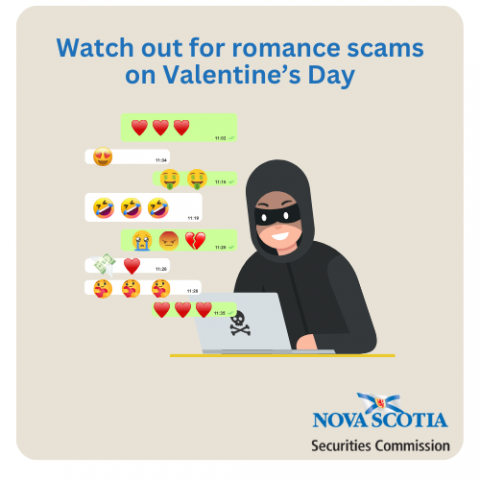Submitted by nsscadmin on

It’s Valentine’s Day, but unfortunately love isn’t the only thing in the air. Frauds and scams have found their way into the world of romance and people are losing more than just their hearts.
In a romance scam a fraudster will enter into a virtual or online relationship with their victim. The rogue lover can pursue victims through email, social media platforms, texting, messaging apps, or through online dating sites.
Once the relationship is established and often blossoming, the fraudster will attempt to get money from their new love interest. They can do so in several different ways but some of the most common include:
- Asking for money due to an emergency, which could be medical, or emergency travel for example,
- Investing in a business venture or some other can’t miss investment opportunity with them, or
- Investing in crypto assets, often touting their own recent investment gains.
Fraudsters will often go to great lengths to convince their victims that their monetary requests are legitimate. This could include phony investment statements or gains, phony medical records or accident reports or photos, or other very convincing stories playing on a victim’s emotions.
If you are involved in an online relationship or have been approached by people online with romantic intentions, there are red flags you can watch for that may indicate they are running a romance scam on you. Some are:
- The person wants to quickly move to a private or different mode of communication (email, text, Whatsapp, Zoom).
- They always have an excuse not to meet in person, and never show their face on camera.
- You receive poorly or oddly written messages, sometimes even addressing you by the wrong name.
- They act distressed or angry to guilt you into sending money.
- They discourage you from discussing them or their situation with your friends and family.
- They claim to live close to you but are working overseas.
In the last two years, the Commission has seen a dramatic increase in pig butchering scams that can sometimes be tied to romance scams. We issued an alert on these types of scams in January, 2023. In these prevalent pig butchering scams, the fraudster will attempt to get their love interest to invest in crypto assets after mentioning that they have recently made a lot of money with such an investment.
The fraudster will try to convince the person to invest a small amount initially, and if they make that investment, they will be shown a balance sheet or account statement showing tremendous gains in a short period of time. This tremendous growth will be used to convince them to invest considerably more.
What the investor doesn’t know is that no actual investment has been made and the tremendous gains are all fictitious. The more they invest, the more they will end up losing.
If you enter into a romantic relationship with someone online, be cautious and remember the following to protect yourself:
- If your online connection asks you for money, they are likely a scammer. Cut off contact right away and seek support.
- Don’t send money, financial details, or important identity documents like your passport to someone you’ve only met online: No matter how long you’ve been messaging them.
- Never agree to transfer money or purchase gift cards for someone else. It could be money laundering and being involved in it is a criminal offence.
- Never send intimate pictures or videos of yourself to people you don’t know. Scammers often use these to blackmail people.
- Don’t keep your online relationship a secret. Speak to people you know about it. It can be easier for others to spot the warning signs.
- Be careful about what you share about yourself online. Scammers can use information about your hobbies, job, or family to target you.
